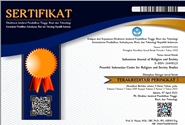Ketimpangan Peran Domestik Rumah Tangga dalam Cerai Gugat Pada Masyarakat Minangkabau
Abstract
Industrialization makes people pragmatic and individualistic. The impact can be seen from the estrangement of family relations. Family ties are getting looser because each person is required to have certain duties and professions to fulfill their needs. Social transformation and deregulation make it increasingly difficult to create social intimacy. The purpose of this is to analyze the inequality of the domestic role of the household in litigation, which is more common than talak divorce, as well as social changes in family relations. The method used in this research is qualitative with descriptive approach. The research data was obtained from the results of interviews with the administrators of the Religious Courts and the people of the City/Regency in the Padang Religious High Court Region related to divorce. Other data search techniques are also carried out by means of documentation and observation to the research location. The main objective of this study is to answer one question; How is the transformation from shifting roles between husband and wife to household harmony. That the effect of social transformation on divorce is 1. increasing divorce due to nusyuz: the wife's disobedience to her husband or the wife's lack of rights and obligations. The independence of women is the main factor. 2. Increasing divorce due to shiqaq: husband and wife fighting and arguing with each other. Disharmony is the most common reason put forward by the plaintiffs. The factors that cause divorce is a form of social deviation. This study agrees with the opinion of Emile Durkheim who said that independence in life and economic level as well as the need for social deregulation in the form of deviation.
Keywords
Full Text:
PDFReferences
Andaryuni, L. (2017). Pemahaman Gender dan Tingginya Angka Cerai Gugat di Pengadilan Agama Samarinda. Jurnal Fenomena, 9(2), 155. https://doi.org/10.21093/fj.v9i2.946
Andriani, A. D. (2020). Peran Istri sebagai Wanita Karier dalam Perspektif Islam dan Pengaruhnya Terhadap Angka Perceraian Indonesia. Jurnal Pendidikan Agama Islam, 18(2), 2020.
Apollo, & Cahyadi, A. (2012). Konflik Peran Ganda Perempuan Menikah yang Bekerja Ditinjau Dari Dukungan Sosial Keluarga dan Penyesuaian Diri. Jurnal Widya Warta, 02(I), 254–271.
Apriani, F., & Anggraeni, L. D. (2019). Efek Psikososial pada Perawat Perempuan yang Menjalani Peran Ganda. Jurnal Kesehatan Saelmakers Perdana, 2(1), 14–23.
Baharuddin, B. (2015). Bentuk-Bentuk Perubahan Sosial dan Kebudayaan. Al-Hikmah, 9(2), 180–205. https://doi.org/10.24260/al-hikmah.v9i2.323
Chotban, S. (2019). Peran Istri Menafkahi Keluarga dalam Pranata Kehidupan Masyarakat Lamakera Desa Motonwutun. Jurnal Al-Risalah, 19(1), 110. https://doi.org/10.24252/al-risalah.v19i1.9686
Febrieta, D. (2016). Moralitas Remaja. 1–16.
Fitrawati. (2020). Praktik Sosial Cerai Gugat Aparatur Sipil Negara Pemerintah Provinsi Sumatera Barat. Universitas Andalas Padang.
Hasmida. (2020). Faktor Meningkatnya Angka Perceraian di Kabupaten Aceh Singkil. Tadabbur: Jurnal Peradaban Islam, 2(1), 128–148. https://doi.org/10.22373/tadabbur.v2i1.59
Listari, L. (2021). Dekadensi Moral Remaja (Upaya Pembinaan Moral oleh Keluarga Dan Sekolah). Jurnal Pendidikan Sosiologi Dan Humaniora, 12(1), 7–12. https://doi.org/10.26418/j-psh.v12i1.46320
Mamahit, L. (2013). Hak dan Kewajiban Suami Isteri Akibat Perkawinan Campuran di Tinjau dari Hukum Positif Indonesia. Jurnal Lex Privatum, 1(1), 12–25.
Mawardi. (2015). Realisasi Tujuan Pernikahan Menurut Syariat Islam pada Kehidupan Berumah Tangga (Penelitian Terhadap Berumah Tangga pada Masyarakat di Desa Pusaka Rakyat Taruma Jaya Kabupaten Bekasi). Universitas Islam Negeri Syarif Hidayatullah.
Moleong, L. J. (2014). Metodologi Penelitian Kualitatif (Edisi Revisi). In Remaja Rosdakarya (Issue 32). Remaja Rosdakarya.
Nisa, H., & Koentjoro. (2017). Some Issues About Women Who File for Divorce in Aceh. Gender Equality: International Journal of Child and Gender Studies, 23(9), 75–85. https://doi.org/10.7748/nm.23.9.12.s14
Nurrahman, M. Y. (2016). Perbedaan Penyebab Perceraian Bgi Wanita Bekerja dan Tidak Bekerja di Pengadilan Agama Yogyakarta Tahun 2013-2015.
Nuryoto, S. (1998). Perbedaan Prestasi Akademik Antara Laki-Laki dan Perempuan Studi di Wilayah Yogyakarta. Jurnal Psikologi, 16(2), 16–24.
Putri, D. P. K., & Lestari, S. (2015). Pembagian Peran dalam Rumah Tangga pada Pasangan Suami Istri Jawa. Jurnal Penelitian Humaniora, 16(1), 72–85.
Rahmayati, T. E. (2020). Konflik Peran Ganda pada Wanita Karier. Juripol (Jurnal Institusi Politeknik Ganesha Medan), 3(1), 152–165. https://doi.org/10.33395/juripol.v3i1.10920
Sanjaya, U. H., & Faqih, A. R. (2017). Hukum Perkawinan Islam di Indonesia (I). Gama Media.
Sarmadi, H. A. S. (2013). Hukum Waris Islam di Indonesia (Perbandingan Kompilasi Hukum Islam dan Fiqh Sunni). Aswaja Pressindo.
Shalihin, N., & Firdaus, F. (2019). Transformasi Gender: Strategi Pembebasan Perempuan dari Jerat Pembangunan dan Kapitalisme. Sawwa: Jurnal Studi Gender, 14(1), 109–140. https://doi.org/10.21580/sa.v14i1.3366
Sholichah, A. S. (2016). Pendidikan Asertif Gender dalam Perspektif Al-Qur’an. Institut PTIQ.
Simbar, F. K. (2016). Fenomena Konsumsi Budaya Korea Pada Anak Muda Di Kota Manado. Jurnal Holistik, 10(18), 1–12.
Sulaeman, M. (2015). Kekerasan Terhadap Perempuan dalam Perspektif Sosiologi.
Yuliantri, A. T. (2020). Praktik Penyelesaian Sengketa Harta Setelah Perceraian Antara Suami Pengangguran dan Istri Pegawai Negeri Sipil pada Masyarakat Desa Samura Kecamatan Kabanjahe Kabupaten Karo (Tinjauan Kompilasi Hukum Islam. Universitas Islam Negeri Sumatera Utara Medan.
DOI: https://doi.org/10.36256/ijrs.v3i2.193
Refbacks
- There are currently no refbacks.
Copyright (c) 2021 Indonesian Journal of Religion and Society

This work is licensed under a Creative Commons Attribution-NonCommercial 4.0 International License.
Indonesian Journal of Religion and Society (IJRS) Is Indexed By:

Indonesian Journal of Religion and Society (IJRS) is distribute under Creative Commons Attribution-NonCommercial 4.0 International License.













